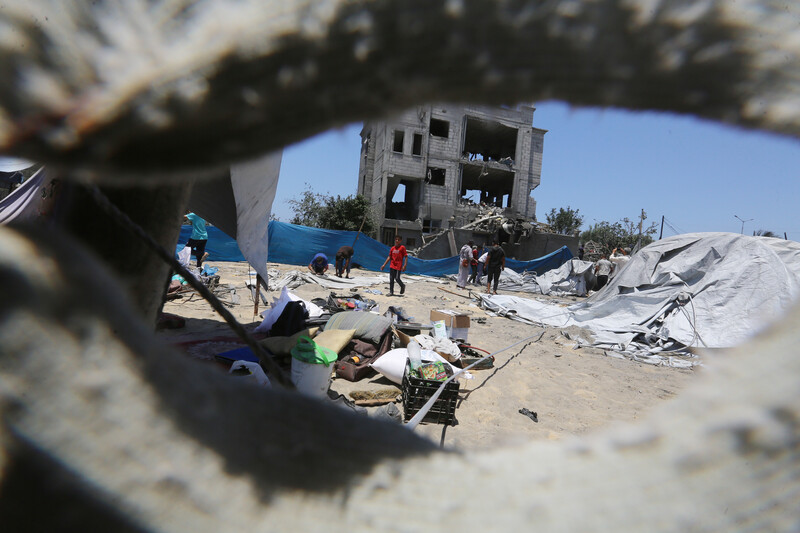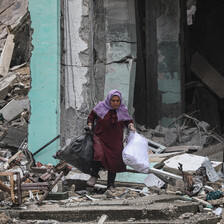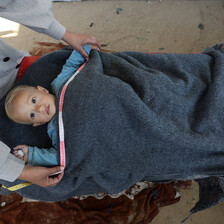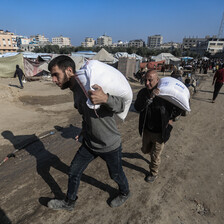The Electronic Intifada 19 December 2024

So-called safe zones, like al-Mawasi, where the author ended up with her father, are not spared Israeli bombardments. Here people relocate after an Israeli bombing in July.
APA imagesBack in April, when the spring sun spread its golden rays across Gaza’s war-scarred fields and devastated neighborhoods, my family faced some serious decisions.
My father was suffering a chronic heart problem and his condition had worsened over the six months of genocide we had survived.
Through the ministry of health, and with the help of international organizations, we had secured a permit for him to be transferred to Egypt for treatment.
The permit was for 16 May.
We had also bought (very expensive) travel permits from an Egyptian broker for my mother and sister to travel ahead in order to find a place for everyone to stay.
Thus it was that in late April, the day before my mother and sister left, we all sat together in the courtyard of our home in Deir al-Balah in the central Gaza Strip.
It would be our last time.
We talked about a lot of things that night. We talked about our dreams for the future. We talked about our situation. We wondered if we would survive or if we would starve to death. We wondered if we would ever return to a normal life.
At the end of the evening, my father, who was in great pain, smiled at us before he retired to bed. “Patience,” he said, “is the key to relief.”
Thwarted plans
On 30 April, my mother and sister traveled to Egypt.
On 6 May, the Israeli military began its offensive on Rafah, seizing the Rafah crossing into Egypt on 7 May.
Our plans had been thwarted by Israel’s genocide. My father and I were stuck, though not at home: due to the intensity of the bombings in our area, three days after my mother and sister left we had been forced to leave the house for a tent in a nearby shelter.
We eventually ended up in al-Mawasi in the west, where aid workers helped us erect a small tent in the sand. By then, we had lost all comforts. We didn’t even have a change of clothes.
The bombings, meanwhile, waxed and waned. One night, late May or early June, the bombardment was so close, I felt the earth shake beneath my feet.
I also realized I had no one to turn to. Over the weeks, I had sought help from relatives and friends for simple things, like helping to carry a mattress, but none was forthcoming.
I concluded that I had no real friendships in times of crisis. And what other friendships are there?
I watched my father. He was trying to be strong, but he was in pain. He was afraid, and so was I. How was I to escape the area with him if I needed to?
His sleep was disturbed by insects in the sand. He silently endured the discomfort, and he tried to reassure me. But he needed someone to comfort him too.
A fire raged in my chest. I felt only anger, helplessness and despair.
Grief
We were not alone, though, in our suffering. Seeing how others were dealing with similar conditions, how others had also lost everything and were also fearing starvation and expecting death, I realized that I may have been harsh on my relatives and friends.
We are all in this together. And we are all overwhelmed just trying to survive.
We tried to find hope amid the chaos. We would gather around a small fire, my father, myself, and others we’d met. We would tell old stories. We would laugh in the face of the pain.
Days turned into weeks. Israel’s genocidal violence only intensified. Our determination to survive only grew.
I had continued my pharmacy studies at Al-Azhar University. Lessons had been discontinued – in fact the university itself was bombed as far back as 11 October 2023 and several times since – but recorded lectures were available online.
This meant that I had to leave al-Mawasi and my father to find areas with internet access in order for me to download lectures and submit assignments.
In August, my father’s condition worsened. He barely ate or drank. I could no longer bear to hear his voice, so weak had it become.
But I also had exams coming, and on 23 August I had left a cousin with my father while I went to study.
He passed away that day. After all we had been through, just he and I, in the months since my mother and sister left, I wasn’t even there in his last moment.
That evening I sat alone in a small tent on a sandy bank in the very west of Gaza. My heart was shattered, and my tears fell like rain. How could I live in a world that no longer contained his laughter? How could I go on without his voice, so strong and vibrant, that used to fill our home?
I didn’t know how to break the news of my father’s death to my mother, but I eventually gathered what little strength I had left to tell her.
Her grief was beyond my ability to put it into words.
Hope
I passed my exams.
I remain in al-Mawasi, in a little tent on a sandy embankment.
I am still alone.
In my solitude, I’ve turned to writing, keeping a journal in which I note down my feelings and thoughts.
Writing brings me some comfort.
From Egypt, my mother told me that she and my sister had finally found a place to live. This filled me with pride, but also trepidation. If I join them, will I ever return? Can I even leave this place, my homeland, where all my memories of my father reside?
But the Rafah crossing is still closed. This is not a choice I face now.
My choice is between grief and hope.
The thing they never tell you about genocide is that despite the overwhelming loss and devastation; despite the suffocating suffering that is everywhere at all times and in every person’s eyes; despite the hunger and the fear, life also continues.
Life continues, and you have to choose how to live it. And my father always taught us to be strong and not be afraid to confront challenges.
So I choose hope. I choose hope to heal myself and I choose hope because it is what my family needs, it is what my people need and it is what my father would have done.
My father was Munther Hamdona. He was a tailor. I am convinced that he is watching us from afar and will always be a part of my journey.
Lina Hamdona is a writer and pharmacy student from Gaza.





